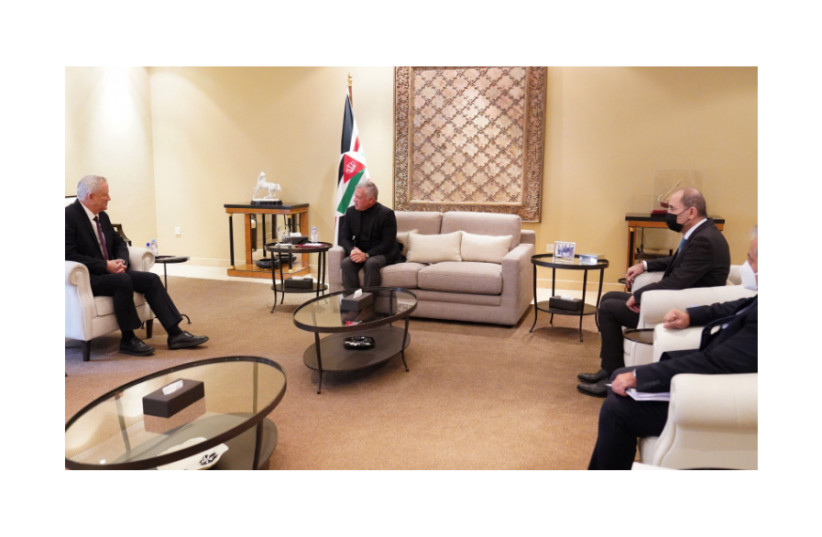Foreign Minister Yair Lapid met with Jordan’s King Abdullah in Amman on Thursday, amid volatility in Jerusalem and the West Bank.
The meeting was meant to try to calm the situation ahead of the Muslim month of Ramadan, which begins on April 2 and overlaps with Passover.
“We agreed that we must act together to calm the tensions and promote understanding, especially ahead of the month of Ramadan and Passover,” Lapid said after the meeting. It was violence in Ramadan last year that sparked the 11-day Gaza war.
Violence has continued to simmer in Jerusalem and the West Bank this month. A Hamas terrorist stabbed two officers in Jerusalem’s Old City on Monday. Israeli police shot and killed the man. A day earlier, a Palestinian stabbed a police officer in the Old City and was shot and killed by the police. That same day, a 16-year-old Palestinian threw firebombs at an IDF post outside Jerusalem, and soldiers shot and killed him.
Lapid underscored after the meeting that Israel’s “special relations with the Kingdom of Jordan ensure a better future for our children. The peace between us is not just being good neighbors, but the moral duty to both nations.”

The foreign minister praised Abdullah for strengthening the relations between the countries and for his willingness to cooperate.
They also discussed normalization and peace between Israel and Arab states.
Abdullah and Lapid expressed hope that Israel and Jordan’s joint energy project will be successful. The countries agreed last year to examine the possibility of Israel building a designated desalination plant for Jordan, while opening a solar field in Jordan for energy to be exported to Israel. Israeli Energy Ministry representatives held meetings with their counterparts in Jordan this week to advance the project.
Prime Minister Naftali Bennett and Defense Minister Benny Gantz have also met Abdullah in Amman since the new government was inaugurated last June.
The king said soon after his meeting with Bennett that he was feeling “very encouraged” that Israel and the Palestinians can “move forward and reset that relationship,” even if the current coalition has said it will not make major moves on Israeli-Palestinian peace.
According to the Royal Court’s Office, King Abdullah stressed the importance of renewed talks toward a two-state resolution to the conflict at the pre-1967 lines. King Abdullah spoke of the significance of maintaining the status quo on Jerusalem’s Temple Mount, also known as al-Haram al-Sharif, and called on Israel to refrain from unilateral actions that would undermine a two-state resolution to the conflict.
Jordanian Foreign Minister Ayman Safadi and Jafar Hassan, who directs King Abdullah’s office, also attended the meeting. Safadi and Lapid also met separately.
Prior to the meeting, Lapid met on Wednesday with Hussein al-Sheikh, the Palestinian Authority head of Civil Affairs who is considered a possible contender to replace Palestinian Authority President Mahmoud Abbas.
Al-Sheikh also spoke of the importance of a two-state resolution.
“I reconfirmed the necessity of having a political horizon based on signed agreements and the resolutions of international legitimacy,” he tweeted. Al-Sheikh said he also spoke against Israeli unilateral measures, adding that he and Lapid also “discussed the regional and international situation.”
In the Knesset on Wednesday, China’s Special Envoy to the Middle East Zhai Jun met with MK Tzachi Hanegbi (Likud), who chairs the Israel-China Parliamentary Friendship Group.
According to the Knesset, Jun spoke of the importance of renewed Israeli-Palestinian talks. He warned that without resolution of the conflict, it would be difficult for Israel to continue to normalize ties with additional Arab states. Jun is also expected to visit Jordan and Egypt during this trip to the region.
The IDF has also been concerned about Israeli-Palestinian tensions. With an eye to ensuring calm with Gaza, Coordinator of Government Activities in the Territories Maj.-Gen. Rassan Alian said the IDF planned to give an additional 2,000 work permits for Palestinians to work in Israel in the labor and business sectors. That brings the total of such permits to 12,000.
On Tuesday, the UN Special Coordinator for the Middle East Peace Process Tor Wennesland spoke of his concern over rising Israeli-Palestinian violence.
“In this volatile situation, all concerned must refrain from actions and provocations that fuel tensions and exercise maximum restraint,” he said. “There can be no justification for violence or terror, which must be condemned by all.”
But he also took issue with the response by Israeli security forces to such violence, which he said resulted in the death of six Palestinians.
Lethal force should be used only when “strictly unavoidable to protect life,” he said. “This uptick in violence is taking place at a particularly sensitive time. I call on political, religious and community leaders to reject violence and speak up against those who try to inflame the situation. We must all work toward restoring hope and the prospect of a political resolution to this conflict.”
